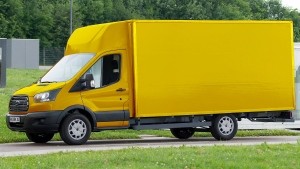D Deutsche Post is further expanding its model range of electric vans with the help of American automaker Ford. Thanks to a partnership with the car manufacturer, the Bonn-based company now wants to offer larger vans.
Post subsidiary Streetscooter and Ford entered into a partnership to build battery-powered delivery vehicles, Post said Wednesday. Based on the chassis of the Ford Transit to produce an electric van, which is larger than the models previously produced by street scooters. The production should begin already next month. By the end of 2018, at least 2500 of these new vehicles will be used by Swiss Post. The Bonn-based company will take over on Streetscooter assembly and distribution of new vehicles, said a Ford spokesman.
With its street scooter, Swiss Post has become a leading manufacturer of electric transporters , The company was founded in 2010 as a start-up from the environment of RWTH Aachen University. In Aachen, electric vehicles were developed that were specially tailored to the needs of Swiss Post’s mail carriers. The corresponding commercial vehicle was presented in 2012, since 2014 it is in the fleet test at Swiss Post. In December 2014, Swiss Post secured all shares of Streetscooter GmbH.
Diesel driving bans could also hit delivery vans
Around 2500 of the transporters already curves for the group through Germany. In the medium term, Swiss Post intends to replace its entire mail and parcel delivery fleet of just under 50,000 vehicles with electric vehicles that are to be powered by renewable energy. However, the vehicles should also be sold outside the Group to customers such as craftsmen or municipalities. The responsible post-board member Jürgen Gerdes had already reported a strong demand.
Also in order to become this gentleman, the post office wants to open a new factory still this year. This should also be created in North Rhine-Westphalia. The capacity for the production of electric vehicles will be doubled by the end of the year from currently 10,000 to 20,000, the post had already announced. Next year, around 20,000 vehicles could roll off the production line.
Last had imminent driving bans on diesel cars in several cities worried about diesel drivers. Such bans could also hit classic delivery vans of parcel services.
